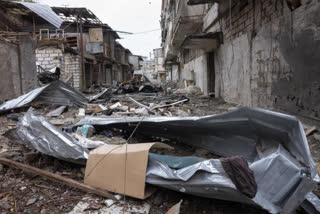New Delhi: The worst clashes between Christian Majority Armenia and Muslim majority Azerbaijan over Nagorno-Karabakh -- a remnant of Soviet legacy that flared up once again on September 27 killing thousands, has drawn global reactions in support of both sides.
As always, South Asia too has its views about it. India, which has been maintaining a balanced relationship with its neighbouring countries, has time and again expressed concern over the resumption of hostility between Armenia and Azerbaijan, which threatens regional peace and security.
India has reiterated the need for both the sides to cease hostilities immediately, keep restraint and take all possible steps to maintain peace at the border.
Achal Malhotra, India's former ambassador to Armenia, explained the conflict in Nagorno-Karabakh and India's stance.
In an interview with ETV Bharat, the former envoy said, "The Armenia-Azerbaijan conflict over Nagorno-Karabakh is almost three decades old and one whose seeds were sown as early as July 1921 when a Christian Armenian majority autonomous enclave -- Nagorno Karabakh, was created on the territory of a Muslim majority Azerbaijan during the incorporation of the South Caucasus region into the then evolving USSR."
Since Armenia, Nagorno-Karabakh, and Azerbaijan were all part of the USSR for 70 years, the issue did not flare-up. Occasionally, there were several petitions from Nagorno-Karabakh to central authorities in Moscow during the next seventy years for its merger with Armenia, but they were all rejected.
"Nagorno-Karabakh's decision to declare its independence in September 1991 in the backdrop of the imminent collapse of USSR and emergence of its constituent republics as independent States resulted in a war between Azerbaijan and Nagorno-Karabakh, which was supported whole-heartedly by Armenia," he added.
Read:Explained: Widening Armenia, Azerbaijan conflict
"The war lasted for at least two years from 1992-1994. A ceasefire agreement was brokered in 1994 by Russia, which was the largest successor state to the Soviet Union. Since then, the United States of America, Russia, and France have engaged Armenia and Azerbaijan as co-chairs of the Organisation for Security and Co-operation in Europe's (OSCE) 11-member Minsk group in a bid to find an amicable solution to the conflict. Unfortunately, they have not been able to put forth any solution which is acceptable to both the sides," he said.
"As a result, their efforts were to manage it even if it cannot resolve the conflict and make sure that it does not become a real 'flashpoint'. They failed once in 2016 when the famous 'Four Days War' between Armenia and Azerbaijan erupted in April 2016 and Russia was able to put it another control."
Malhotra underlined that the most recent flare-up on September 27 is, however, unprecedented in more than one sense: in its intensity and scale, it has surpassed all previous clashes, including the "Four Days War" in April 2016.
"One of the reasons, in my opinion, is that Turkey which so far had only extended moral support to Azerbaijan has now come out in the open and is offering direct involvement in the conflict. There are reports that Turkey is facilitating the participation of mercenaries from Syria and Libya to fight alongside Azeri forces," he pointed out.
Read:Nagorno-Karabakh fighting raises threat of deadly escalation
He said that Turkey is doing this because it is aspiring to be a leader of the global Islamic community and also a regional player. "It is perhaps challenging Saudi Arabia's leadership of the Islamic world."
"Secondly, it looks like that even Azerbaijan is now tired of the efforts being made by the International community because of what happened in 1992-1994. When the war ended, the ethnic Armenians had taken control not only of Nagorno-Karabakh but also seven surrounding districts of Azerbaijan. Armenia had also created a land corridor between Armenia and Nagorno-Karabakh calling it the Lachin corridor," he highlighted.
